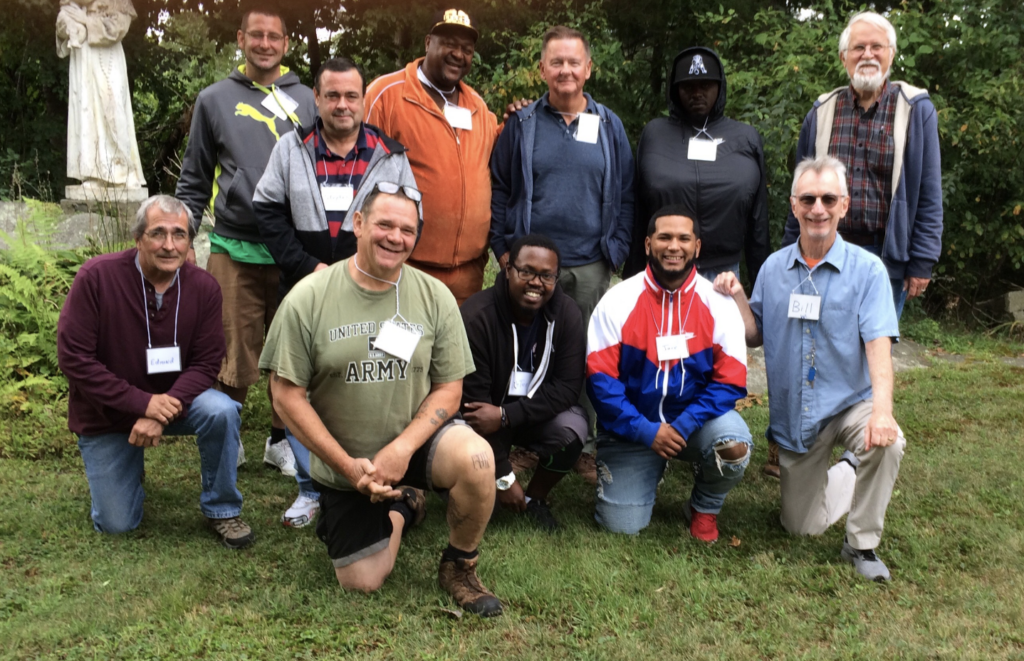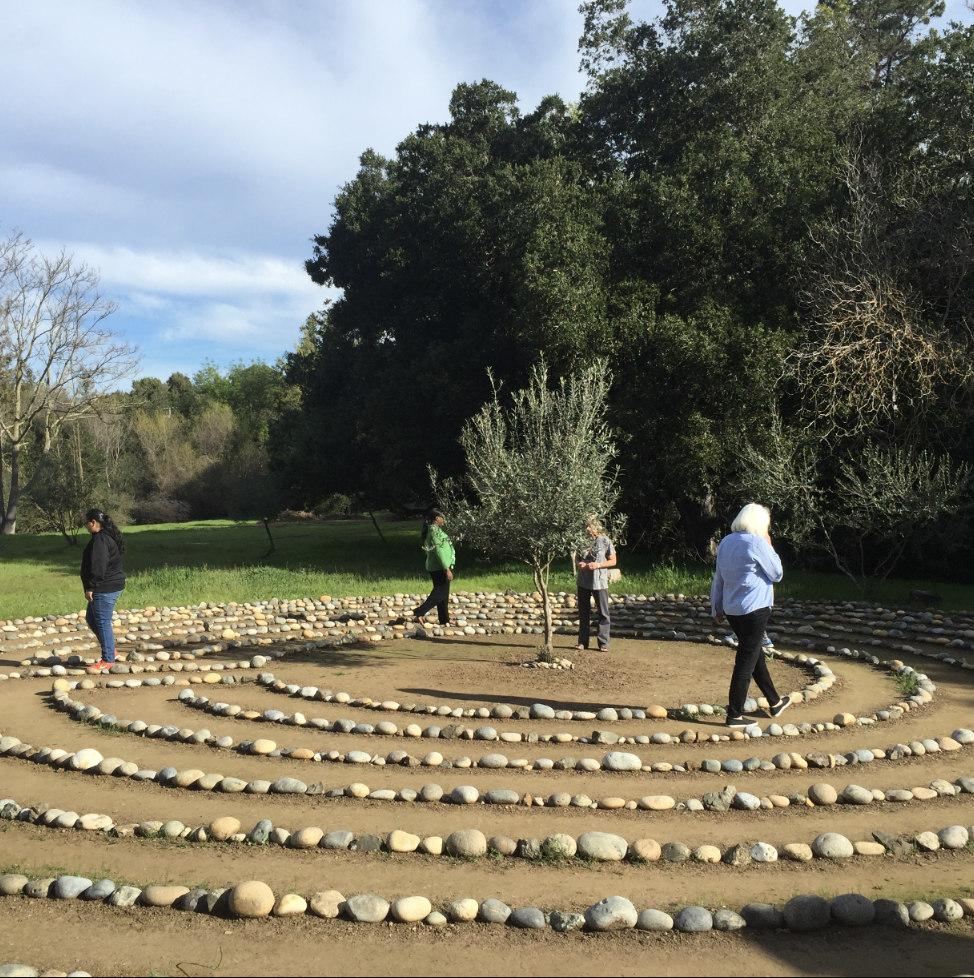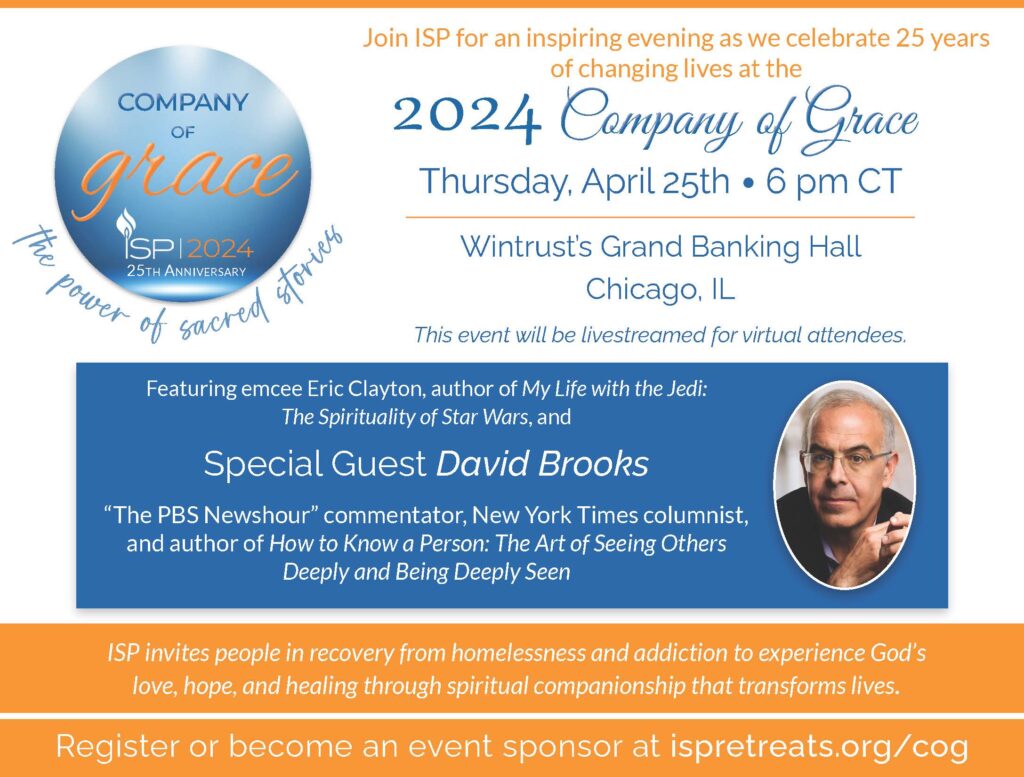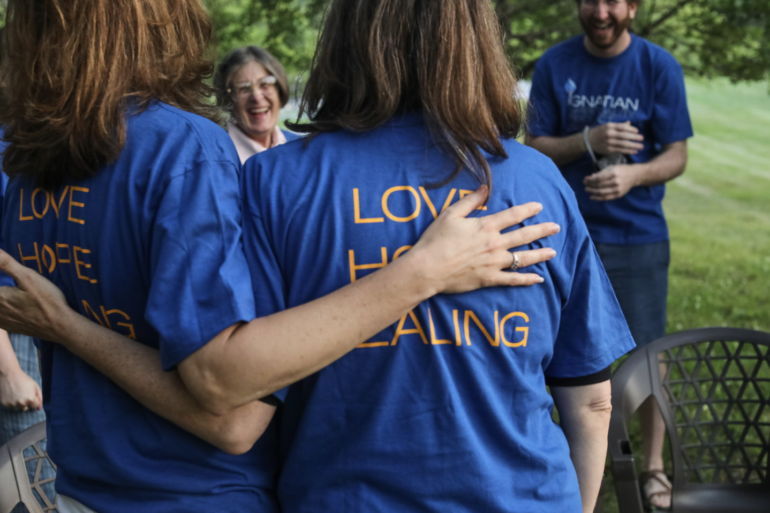Born out of a single overnight retreat in Chicago for a dozen men trying to rebuild their lives as they recover from homelessness and addiction, the Ignatian Spirituality Project (ISP) has grown into a movement with over 600 volunteers in 20 cities across the U.S., Canada and Ireland.
Even though ISP is under the umbrella of the Catholic Church, it is “spiritual, not religious,” said Catherine Ruffing Drotleff, the Director of Advancement and Communications.
ISP relies on shelter partners who help identify candidates for the program; ideally, people will have three months of sobriety. The group offers overnight retreats — typically on Saturday and Sunday — and they are free to participants, supported by philanthropy. Participants are not chronically homeless but have usually transitioned to a shelter. There is also a follow-up component on a weekly or monthly basis when ISP holds a reflection meeting which helps to build a sense of community for participants.

Tammy Davidson, 61, of Dayton, Ohio, felt like she had reached rock bottom. She had been using alcohol and drugs for about 10 years. She was living in a women’s shelter, Mercy Manor, and had just turned 50. “I was in a homeless shelter, I had lost everything,” she said.
The drugs had become a problem in her 40s and she lost her career working with people with disabilities. She never had children but had five siblings, and they entrusted her to care for her nieces and nephews.
One of her brothers was her “party buddy.” Two of her siblings died from addiction, she said. Davidson would go from house to house in what she called “couch hopping.” Her drug of choice were opiates and she found herself having to do more and more. She overdosed once.
And yet her siblings allowed her to babysit their children. Her low point came when she was holding her five-year-old nephew on her lap, reading to him and getting high all at the same time. “Thank God he doesn’t remember that and thank God he didn’t get hurt,” she said.
Her siblings gave her an ultimatum. “They said they were done — they would not sit and watch me kill myself.”
Davidson entered Mercy Manor, a homeless shelter and started a 12-step program. Later she discovered ISP, which she said was life changing. “As soon as we pulled onto the grounds of that place, I could feel the spirit,” she said.
Kevin Graves, 64, of San Diego, California, had a similar story. He had been homeless for a year and a half because of alcoholism. He had been a case manager in social work, married for 27 years and had four children and three grandchildren.
Graves lives now in a men’s shelter and had been in and out of programs for 10 years. He said it was ISP that “gave me the space to come to my own conclusions.” Graves also views ISP as spiritual, not religious.

“You walk in, and you have no self-esteem whatsoever. I had hit rock bottom in my life. ISP gave me the motivation to move forward — not in a monetary way, but a spiritual way. 70% of the guys have this void. ISP helps with the void. They may not have all the answers, but they give you space with what they offer, to find it.”
Today, his relationship with his wife is much better — not perfect, he said, but every day is progress. “My wife is very supportive. She says she wasn’t going to lose her husband to a bottle and alcoholism.” His children, too, are “happy to have their dad back.”
Today both Graves and Davidson volunteer for ISP. He often hears men say, “I am a failure, I will never get out of this, I will always be homeless.”
It is the unconditional support found at the ISP retreats that ignites the healing. “[The counselors at ISP] don’t give up,” Graves said.
Today Davidson volunteers at the retreats and shares her story. She also goes out into the community and recruits people from other recovery houses to come to the retreats. She is also now a house manager at Mercy Manor. “I would never have dreamed that all these years later, after being a resident there, I would now be a house manager,” she said.
She is also recovering from ovarian cancer surgery. She is doing well and so grateful to the ISP community for supporting her. “I truly feel they helped save my life,” she said.
And Graves, too, credits ISP for helping to turn his life around. He said his journey is defined by giving back, volunteering with ISP and helping others. Most of all, he says that ISP has kept him sober.
“The realm for which God has given me is more sufficient than to find an excuse to go out and drink,” he continued. “I used to think drinking gave me what I did not have. Now spirituality does that.”
How To Help:
A donation to Ignatian Spirituality Project directly supports a compassionate mission that transforms lives through spiritual healing and companionship. Your contribution helps empower individuals recovering from homelessness and addiction, fostering communities of hope and belonging.

Also, join and support ISP with David Brooks on April 25th at Wintrust Hall for the Company of Grace Gala! Get your tickets today by visiting ISP Company of Grace online.

More From Better:
- You Said It: Radical Generosity Chicago Is Connecting, Motivating and Mobilizing to Assist Families in Need
- A Path to Renewal: How Ignatian Spirituality Project Offers Hope and Healing for Those Struggling with Addiction and Homelessness
- 31 Best Things to Do in Chicago and the Suburbs This March 2024

Susan Berger is a freelance journalist in Chicago and has written for the Washington Post, New York Times and Chicago Tribune. She was a 2021 CDC Fellow through the Association of Health Journalists, a National Press Foundation Fellow in 2019 to study vaccines and dementia. She also has written for Health Magazine, National Post, Agence France-Presse, and CBC and Better Magazine. Ms. Berger has appeared on the Today Show, NBC Nightly News, BBC World News, CNN, WGN-TV, WTTW-TV and on CBC Radio. Her work can be viewed at www.bergerreport.com and you can follow her on Twitter @Msjournalist

